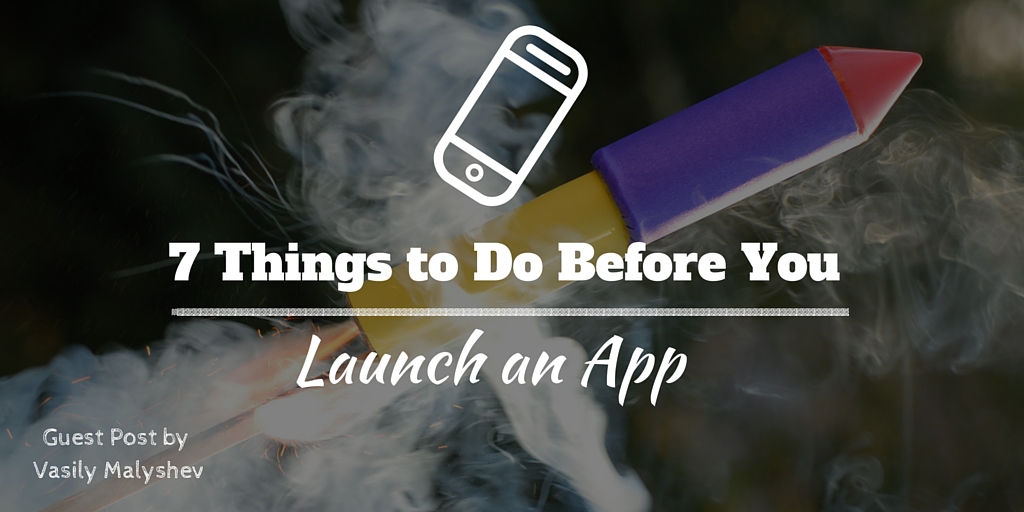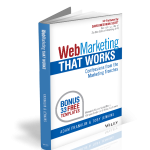7 Things to Do Before You Launch an App
This is a guest post – Vasily Malyshev was born in Moscow, Russia, today he holds dual legal qualifications of Juris Doctor in the USA and Jurist in Russia. At age 19, Vasily formed his first company “Malyshev EduSys” which created one of the top LSAT preparation apps and focused on creating mobile applications that would help students prepare for school admission exams in USA and all over the world. Two years later Vasily broadened the scope of his work and formed “Messapps”, an app development firm that works with entrepreneurs to help them transform their ideas into successful app businesses. In 2015, Messapps was named one of the top app development companies in New York.
Welcome Vasily…

You can’t avoid it…
Smart devices and mobile phones have taken over our life.
You can barely walk down the street without running into someone who is looking down at their phone.
But this is a good thing – because it presents opportunity.
Capturing your customers attention can now be done on an entirely new level, and it’s more personal than ever.
The platform for doing so is their smart devices, and the vehicle is apps.
Today I want to talk to you about what you need to do BEFORE you launch an app.
Let’s say you’ve decided to create an app for your business, gone about developing it and you’re ready to let the world see it.
Before you launch your app, you need to do a few things in what is called the ‘pre-launch phase’ in your app’s life.
In this phase you must turn your attention over to marketing and planning. This part of the process is crucial to the success of your app.
1. Get a website

(Source)
It is important for your app to have a website.
This is not a browser version of your app, but a website that acts as an overview of the app and directs traffic to the App Store. This website must be clean, appealing, and clearly show potential users what the app is for and its main features.
It must also have an obvious section that can be filled out for people to be notified (usually by email) of when the app is launched. This part is most important because external traffic is going to be directed here to help establish a potential initial user base.
Make sure that all other forms of marketing for the app, including social media accounts and pre-launch reviews or press releases, direct the viewer to this website and the signup form.
Be sure to refer to this list when creating your website to make sure you don’t leave out anything important:
- App logo
- App slogan
- Links to social media accounts
- A section to sign up to be notified of the launch
- A brief overview of the app
- More detailed information about the main or unique features of the app with accompanying screenshots
- App video (if applicable)
- Additional screenshots of the features that have not yet been highlighted
- Reviews of the app by the media (if applicable; otherwise design and develop this section of the website and keep it hidden until you have reviews)
- Contact form
Once you launch your app, you’ll want to alter the website a bit to include:
- Reviews by the media
- Links to download the app on all supported platforms
- The section to sign up to be notified of launch, now changed so the text invites users to subscribe to email updates
2. Attract publicity
You’ll want to reach out to media outlets to review your app or feature a press release. Gathering these links back to your website will immensely help generate an initial user base.
To generate publicity, you should reach out to relevant journalists and other writers with a link to a full press kit to make it easy for them to see all the information about your app in one place.
Follow up if they don’t respond in a timely manner, and if they do show interest, direct them to a clean, bug-free beta version that they can try out.
Social media and review websites are also great ways to get some buzz going for your app!
3. Optimise for the app store

(Source)
App store optimisation (ASO) is important for getting your app found by people who aren’t necessarily searching specifically for your app.
Pre-launch ASO includes research into your competition and target market to analyse what keywords and designs will lead to the highest incoming traffic numbers.
The components that make up ASO are:
- App name with keywords
- Description with first lines that sell
- Keywords that are hidden from users but are used by the App Store in determining your rankings
- Eye catching app icon
- Screenshots of the five most important or interesting features of your app, with accompanying descriptive text.
- Video of the app in use to show the user interface (UI) and user experience(UX) (optional but highly recommended)
4. Use beta testers
What’s not strictly necessary but highly recommended is for you to open a beta version of your app up to a beta tester group.
This group is given exclusive access to the app before launch and is given the task of fully using the app and taking note of any bugs, unclear UI, annoying UX, or logic gaps, and general feedback about the app. You can use platforms such as TestFlight to host the beta version of your app.
Using beta testers is a great way to get fresh sets of eyes using your app. You, the designers, and/or the developers have been working on this app for a long time and are more likely to become accustomed to certain things that beta testers can point out.
Once you gather all of this data, you can fix the important things that need fixing before releasing the final version to the public.
5. Set up analytic tools

(Source)
If you’ve been following our Appreneur Academy (which you should be for maximum success!), then you should’ve set up app analytic tools by adding them into the app code.
Before you launch your app, there is not much you can measure besides beta testers – which are important to track – but it’s much harder to code these tools into the app after you launch it. They’re necessary to track your app’s data once it is launched, and will provide useful information for improving, and include tools such as Google Analytics, Flurry, and Localytics.
Make sure to read more about the most popular app analytic tools in our detailed overview.
6. Choose a launch date
Selecting a good launch date can be the difference between getting 100 downloads on the first day and getting 1000. While you can’t control all big events to make sure they don’t happen on your launch date, you can do a little research and make sure you at least choose a date that does not overlap with any planned events.
There has been research into which day of the week is best for launching an app based on category, and for the most part, it has been found that the weekend is the best time to launch an app for most categories (aside from business or medical apps, which generate the most revenue during the week).
Well in advance of your planned launch date, you want to make sure your app has been fully approved by the App Store. Planning for a specific date is pointless if you’re being prevented from launching it on that day.
7. Plan a launch party

(Source)
In the busyness of making sure your app launch goes off without a hitch, don’t forget to also plan a launch party! Not only do you deserve to celebrate, but a launch party can also get you an initial user base.
When planning a launch party, you want to make sure the time of day and day of the week is optimal for the maximum number of guests. Additionally, you’ll want to reach out to journalists and bloggers and invite them to cover your launch party and your app.
Finally, you’ll want to make sure your venue has wifi that can host all of your guests during this time so they can download your app. If your app is a paid app, you’ll want to consider giving guests a code to download the app for free.
Follow Messapps to learn more about how to create successful apps!
 About Vasily
About Vasily
Vasily Malyshev was born in Moscow, Russia, today he holds dual legal qualifications of Juris Doctor in the USA and Jurist in Russia. At age 19, Vasily formed his first company “Malyshev EduSys” which created one of the top LSAT preparation apps and focused on creating mobile applications that would help students prepare for school admission exams in USA and all over the world. Two years later Vasily broadened the scope of his work and formed “Messapps”, an app development firm that works with entrepreneurs to help them transform their ideas into successful app businesses. In 2015, Messapps was named one of the top app development companies in New York.
Bonus 3 3 Free Templates
3 Free Templates
Download the 33 free templates from Toby and Adam’s book.
Content Marketing Sales Funnel
Your content marketing sales funnel is all about getting people to know, like and trust you by nurturing them with the right information at the right time.

 About Vasily
About Vasily
